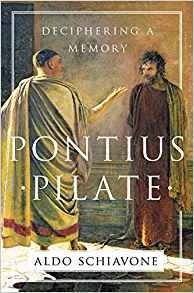 Aldo Schiavone, Pontius Pilate; Deciphering a Memory, translated by Jeremy Carden (New York: Liveright, 2017), 238pp.
Aldo Schiavone, Pontius Pilate; Deciphering a Memory, translated by Jeremy Carden (New York: Liveright, 2017), 238pp.
The Yale historian Jaroslav Pelikan once observed how "one of the many historical ironies of the Christian message is that of all the famous ancient Romans — Julius Caesar or Cicero or Vergil — none has achieved even nearly the universal name recognition of an otherwise obscure provincial gauleiter named Pontius Pilate, who has the distinction — which he shares with, of all people, the Blessed Virgin Mary, and with no other human creature — of having his name recited every day all over the world in the Nicene Creed (as well as in the Apostles' Creed): 'crucified on our behalf under Pontius Pilate.'"
Pilate was the Roman governor of Judea for the ten years 26 to 36, during the reign of the emperor Tiberius. He was a key actor in one of the most important pivot points in all of Western history, standing "between two unique and extraordinary stories: that of the Romam Empire at the peak of its power and that of the Christian faith at the time of its beginnings." Although Pilate's interaction with Jesus lasted only a few hours, the consequences of the encounter have reverberated down to our own day.
In this clash between Christian memory and imperial history, it was Pilate who made a fateful decision of "incalculable magnitude." It was Pilate who determined the destiny of the prisoner Jesus. For the Jews, Jesus was a sacrilegious blasphemer, and for the Romans a dangerous fomenter of disorder who threatened social stability. Between the two stood Pilate.
But who was Pilate? A bungler? A despot? An accomplice? Tertullian famously called him "a Christian at heart." For his biographical reconstruction, Schiavone draws upon the four gospels, especially John, along with four important extra-biblical sources—Josephus, Philo of Alexandria, Tacitus, and an epigraph discovered in Caesarea.
Aldo Schiavone is a classicist at the Istituto Italiano di Scienze Umane, a member of the American Academy of Arts and Sciences, and the author of three previous books, The End of the Past: Ancient Rome and the Modern West (2000), The Invention of Law in the West (2012), and Spartacus (2013), all on Harvard University Press.


